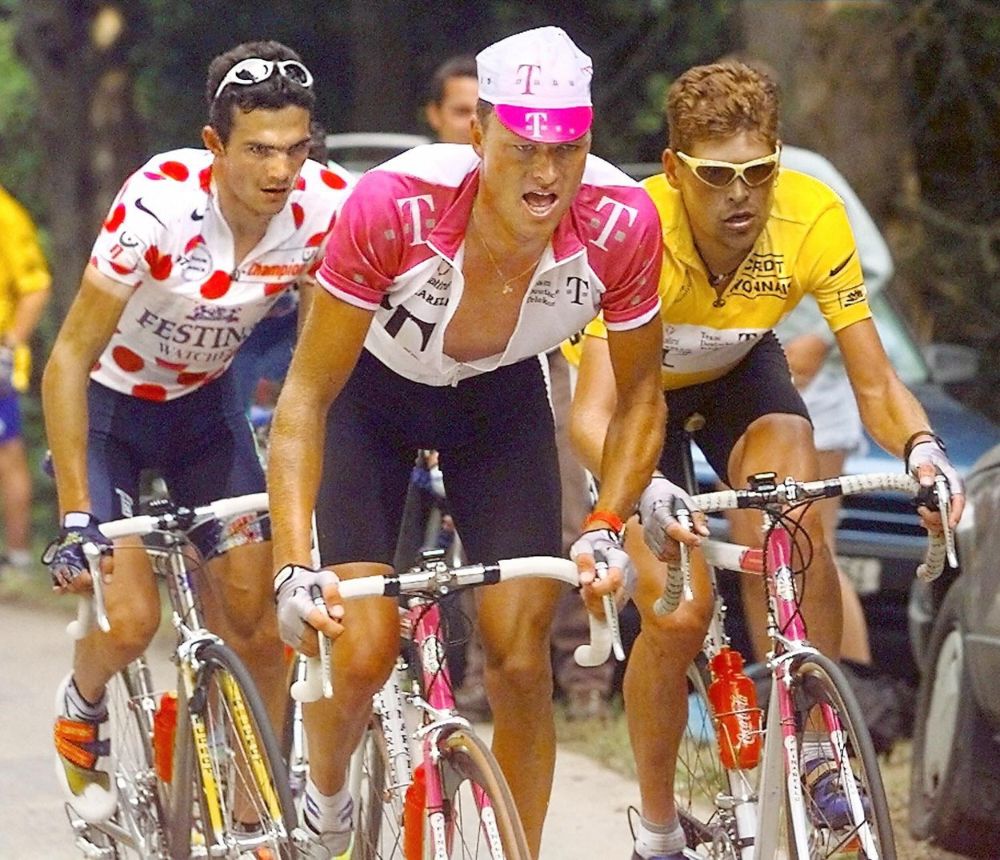Rivalries are not uncommon at the Tour, Bartali and Coppi or Hinault and LeMond are perfect examples of two great cyclists competing for the title. It’s far less common for a rivalry like that to form inside a team. Modern Tour de France teams typically have pre-defined roles for each of their riders, and Team Telekom at the 1997 Tour was no exception. The team leader and defending champion from 1996, Bjarne Riis, was the one aiming for the general classification win. The other riders on the team were supporting him in this effort. And chief among them was Jan Ullrich, a super-domestique, the most important rider to help Riis win his second title.

In interviews before the race Ullrich was very loyal: “Bjarne is our captain. It’s all about him. We will get him to another title.” But he couldn’t help but add: “If something happened to Bjarne things might change.” Ullrich was 10 years younger than Riis and showed great talent. He was clearly a future contender for the Tour de France gold. Even the Team Telekom director, Walter Godefroot, had a hard time deciding who should be going into the 1997 Tour as the team leader.
Team Telekom wasn’t the only one with dangerous contenders though. The Frenchman Richard Virenque from Festina–Lotus, Marco Pantani from Italian Mercatone Uno, or Abraham Olano riding for the Spanish team Banesto were all able to bring the Tour title home. And none of them had to deal with a rival inside their own team.
The tension inside the team was clear from the very first stage. A group accident 11 km before the finish divided the peloton. Ullrich stayed in the leading group, but Riis fell back to the second group a minute behind. The whole Telekom team waited for the defending champ to help him finish the race strong. Ullrich was the only exception. He was given the green light by the team director to stay in the leading group. Riis was not happy about this decision.

Both riders stayed on good terms for several following days until the Pyrenees. That was where things started to change. In stage 9 Virenque took charge and attacked at the last climb to Val Louron-Azet after a whole day of aggressive riding. Ullrich was able to respond, Riis was left behind. Ullrich rode so well that day it seemed he could easily strike back and drop Virenque. But he was not given the permission, not yet. Despite a 30-second deficit in the finish, Riis still asserted that he was the leader. But it was starting to look like actions were speaking louder than words.
Stage 10 culminated with a 32-km-long climb to Arcalís. With around 8 km left, Riis started to fade and was dropped. His team spirit was stronger than his ego and he sent his team mate to pursue with these words: “If you feel strong, go.”
Jan Ullrich waited for a confirmation from the team director. When Godefroot replied with “You’re the leader now,” Ullrich started a pursuit. He caught up with both Pantani and Virenque and soon left both excellent climbers behind. Ullrich finished a whole minute ahead of everyone. Riis was devastated after losing 3 minutes and 30 seconds.

Ullrich commented: “I’m absolutely exhausted but absolutely happy.” Riis admitted defeat: “Jan was in great shape today and it was clear he had to attack. It’s important for us to keep the yellow jersey. The Tour can only be won with the help of your team.”
A new star was born that day. “Voilá le Patron,” said a headline in L’Équipe. Here is the boss. Merckx and Indurain were in agreement: “It’s decided.” Hinault asserted: “A new era of cycling is here. Ullrich will dominate for seven or eight years.” Only Virenque was not so eager to applaud.
Stage 12 was a hilly time trial where Ullrich continued to excel. He caught up with Virenque, who started before him, and increased his lead to 5 minutes 42 seconds! Germany was in full cyclo-mania celebrating their new Tour de France giant as the newspaper Bild called him. This young cyclist achieved what politicians couldn’t in the seven years since Germany reunited. His riding connected the east and the west.
The only thing that was standing between him and the Tour title was the Alps. Marco Pantani won the following stage that culminated with the mythic climb to Alpe d’Huez. Fuelled by the crowds he was able to drop Riis, Virenque, and even Ullrich. And the unlucky streak continued in the next stage.

Ullrich fell in the beginning of stage 14 and the leading group got away from him. The whole Telekom team including Riis, now in the role of a domestique, worked hard to get Ullrich back to the front of the race. They caught up with the sole stage leader Virenque with around 21 km to go. Ullrich and Virenque fought till the end, the Frenchman eventually taking the stage win. The German superstar later commented: “What Bjarne did for me today was fantastic! I can’t thank him enough. He really showed his character.”
Ullrich was leading by six and a half minutes and it seemed like the only thing that could beat him was his own body. And that was exactly what started happening. Ullrich was battling a cold and increasing exhaustion in the last days. Invigorated by a surprise visit from his mother and girlfriend after stage 17 he continued to fight. And it worked! He even managed to extend his lead in the last time trial and beat Virenque again. Ullrich’s winning margin of 9 minutes and 9 seconds is the highest since 1984 when Fignon won by 10 minutes. He also became the youngest champion after the war.
“I finished second in last year’s Tour de France and even my postman didn’t know who I was. Now women are throwing themselves at me,” said Ullrich after returning to his home country.




